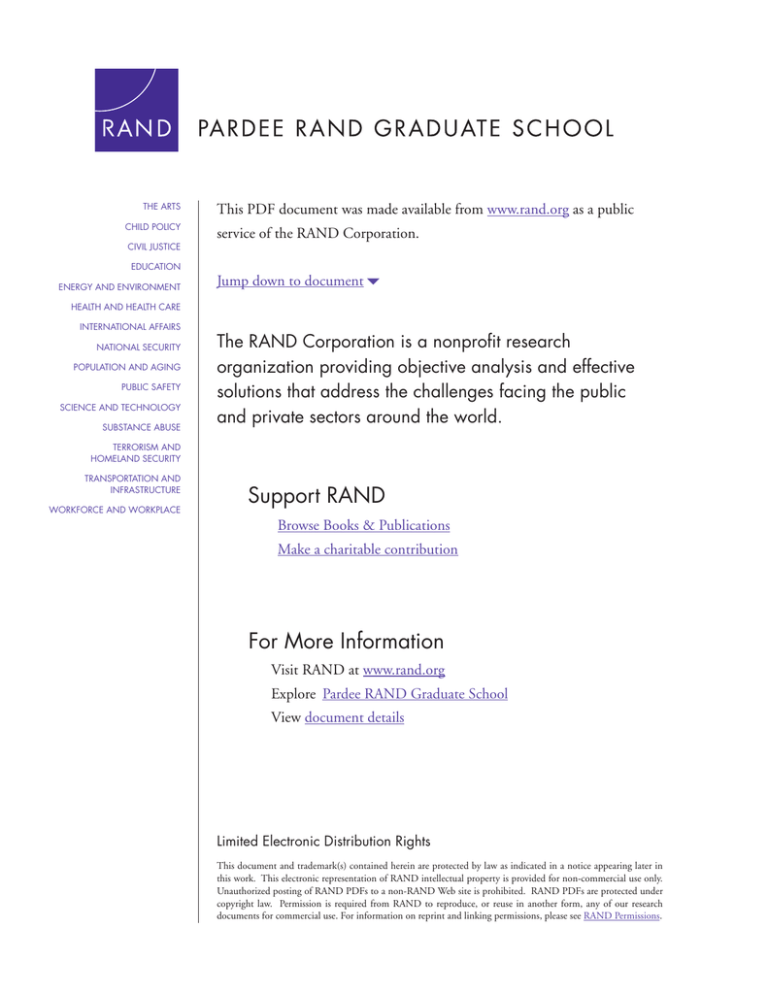
THE ARTS
CHILD POLICY
CIVIL JUSTICE
EDUCATION
ENERGY AND ENVIRONMENT
This PDF document was made available from www.rand.org as a public
service of the RAND Corporation.
Jump down to document6
HEALTH AND HEALTH CARE
INTERNATIONAL AFFAIRS
NATIONAL SECURITY
POPULATION AND AGING
PUBLIC SAFETY
SCIENCE AND TECHNOLOGY
SUBSTANCE ABUSE
The RAND Corporation is a nonprofit research
organization providing objective analysis and effective
solutions that address the challenges facing the public
and private sectors around the world.
TERRORISM AND
HOMELAND SECURITY
TRANSPORTATION AND
INFRASTRUCTURE
WORKFORCE AND WORKPLACE
Support RAND
Browse Books & Publications
Make a charitable contribution
For More Information
Visit RAND at www.rand.org
Explore Pardee RAND Graduate School
View document details
Limited Electronic Distribution Rights
This document and trademark(s) contained herein are protected by law as indicated in a notice appearing later in
this work. This electronic representation of RAND intellectual property is provided for non-commercial use only.
Unauthorized posting of RAND PDFs to a non-RAND Web site is prohibited. RAND PDFs are protected under
copyright law. Permission is required from RAND to reproduce, or reuse in another form, any of our research
documents for commercial use. For information on reprint and linking permissions, please see RAND Permissions.
This product is part of the Pardee RAND Graduate School (PRGS) dissertation series.
PRGS dissertations are produced by graduate fellows of the Pardee RAND Graduate
School, the world’s leading producer of Ph.D.’s in policy analysis. The dissertation has
been supervised, reviewed, and approved by the graduate fellow’s faculty committee.
Getting the Policies Right
The Prioritization and Sequencing of
Policies in Post-Conflict Countries
Anga R. Timilsina
This document was submitted as a dissertation in July 2006 in partial
fulfillment of the requirements of the doctoral degree in public policy analysis
at the Pardee RAND Graduate School. The faculty committee that supervised
and approved the dissertation consisted of Gregory Treverton (Chair),
James Dobbins, and Robert Lempert. Francis Fukuyama of Johns Hopkins
University was the external reader for the dissertation.
PARDEE RAND GRADUATE SCHOOL
The Pardee RAND Graduate School dissertation series reproduces dissertations that
have been approved by the student’s dissertation committee.
The RAND Corporation is a nonprofit research organization providing objective analysis
and effective solutions that address the challenges facing the public and private sectors
around the world. RAND’s publications do not necessarily reflect the opinions of its research
clients and sponsors.
R® is a registered trademark.
All rights reserved. No part of this book may be reproduced in any form by any
electronic or mechanical means (including photocopying, recording, or information
storage and retrieval) without permission in writing from RAND.
Published 2007 by the RAND Corporation
1776 Main Street, P.O. Box 2138, Santa Monica, CA 90407-2138
1200 South Hayes Street, Arlington, VA 22202-5050
4570 Fifth Avenue, Suite 600, Pittsburgh, PA 15213
RAND URL: http://www.rand.org
To order RAND documents or to obtain additional information, contact
Distribution Services: Telephone: (310) 451-7002;
Fax: (310) 451-6915; Email: order@rand.org
EXECUTIVE SUMMARY
One of the most pressing issues in the post-conflict reconstruction field is how to prioritize
and sequence political, social, and economic policies to enable post-conflict countries to sustain peace
and reduce the risk of violence re-occurring. Analyzing three cases of post-conflict reconstruction
(Cambodia, Mozambique, and Haiti) and expert opinions of 30 academicians and practitioners, this
study identifies major reconstruction policies, outlines the preferred way to prioritize and sequence
them, and develops a framework to help policymakers better navigate the complexities and challenges
of forming appropriate policies.
Security and development are interdependent: Development fosters security and security
fosters development. However, in the early stages of reconstruction in most post-conflict countries,
security must be achieved first. Without a sustained improvement in the security situation, other
reconstruction efforts, such as relief efforts, political reforms, democratization, economic reform and
reconstruction, are not possible. However, the question of how to achieve security is a contextspecific. After security, important policy priorities should be building effective, accountable, and
inclusive governance institutions, institutionalizing democracy at the national and local levels through
free, fair, participatory, and inclusive elections. Similarly, economic stabilization is needed to revive
market, attract investment, generate employment opportunity, and create an environment for economic
recovery and stability.
How policies are sequenced in the post-conflict reconstruction environment is non-linear,
context-dependent and specific to the needs and requirements of each country. Nevertheless, the top
priority in early reconstruction efforts should be to generate rapid and visible results. Secondly,
although planning and preparation can take place in the early stage, most long-term infrastructure
development projects should be implemented in the medium, rather than in the short term.
Recognizing that the post-conflict reconstruction is a complex process, this study has also
developed a framework for guiding policy prioritization and sequencing. The framework summarizes
the areas of consensus and near-consensus regarding a policy, identifies context-specific issues, and
outlines the prerequisites needed to implement the policy.
Finally, this dissertation acknowledges that political backdrop is the major limitation for
implementing reconstruction policies and calls on the international community to find some
institutional mechanisms to address the underlying difficulty of the political situation.
iii






